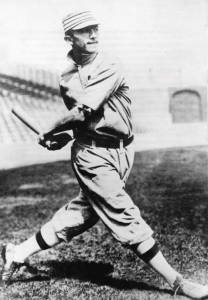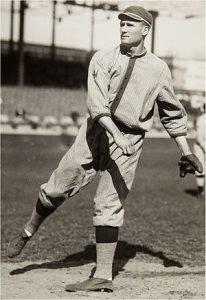Walter Johnson’s Beanball Stymied Nemesis Home Run Baker
March 9, 2024 by Barry Sparks · Leave a Comment
For nearly a decade, four-time home run champ Frank “Home Run” Baker and strikeout king Walter Johnson waged one of the most intense rivalries in the American League.
From 1909 through 1913, the Philadelphia Athletics slugger dominated the Washington Senators fireballer. When Johnson was considered unhittable by many American League batters, Baker batted .385 against him. He inflicted considerable damage as he bashed four home runs, three triples and six doubles.
The Big Train called Baker “the most dangerous batter I’ve ever faced.”
A single pitch on May 8, 1914 , however, shifted the power structure between the two. Both players were in their prime when the Athletics visited Washington early in the season.
In 1913, the 25-year-old Johnson posted a 36-7 record, a 1.14 ERA and fanned 243 hitters. The 26-year-old Baker led the American League in home runs with 12 and RBI with 117 while batting .337.
That season, Baker clouted two home runs off of Johnson, a feat that stirred fans and fellow American Leaguers.
His home run on June 2, 1913, cleared the right field fence at Griffith Stadium. Over-the-fence homers were still rare, particularly against Johnson. The Senator hurler surrendered just 97 homers in 5,942 innings pitched. Nearly one-half of the 40 homers off him in Washington were inside the park.
Later that month, on June 28, Baker once again tagged Johnson for an over-the-fence homer.
Stanley Milliken of the Washington Post reported that it was “one of the most vicious blasts ever seen at the Georgia avenue field.” The Brooklyn Daily Eagle reported the homer was the “longest ever hit at the Washington grounds.”
No one had hit more than two homers off of Johnson, but now Baker had two in one month.
Johnson posed problems for most sluggers because he had a blinding fast ball which he threw with a sidearm motion. It was not easy to pull or hit it with power. He also pitched most of his home games in spacious Griffith Stadium, which measured 407 feet to left field, 421 feet to center field and 328 feet to right field.
Baker slugged two homers against Johnson in 1911, including the first over-the-fence homer the Senators great surrendered.
Baker’s past success was fresh on Johnson’s mind when he entered the game in the bottom of the sixth inning with the Senators leading 5-3. The A’s battered Johnson for six runs in three innings in his worst relief performance of his career. Johnson was mired in his misery when Baker stepped to the plate.
Johnson’s frustration level was understandably high as he faced his nemesis. Plus, there was talk the Washington ace had lost some of his speed that had made him so effective, and he was being hit harder than ever before.
Baker always feasted on Washington pitching and hit Johnson better than anyone else in the league. He was a tough out, no matter which Senator pitcher was on the mound. Washington hurlers tried to stymie Baker’s production by brushing him off the plate, either with inside pitches or pitches around his head.
Johnson, however, disdained the beanball. He had never thrown at a player’s head. He said, “The beanball is one of the meanest things on Earth and no decent fellow would use it. The beanball is a potential murderer. If I were a batter and thought the pitcher really tried to bean me, I’d be inclined to wait for him outside the park with a baseball bat.”
Encouraged by catcher John Henry, who was filling in for the injured Eddie Ainsmith, Johnson “let fly a high fast one which almost put the home run king into a state of dreamless slumber,” according to the Washington Post.
Baker hit the ground with a thud as Johnson’s 90 mile-per-hour-plus fastball whistled by his head, less than an inch away. “It was duck or no dinner,” Baker later recalled.
According to the normally mild-mannered Johnson, it was the only time he threw at a batter in his 20-plus year career, and he always regretted it.
The Athletics and Senators played to a 9-9 tie, which was called after 10 innings because of darkness. While the game didn’t mean anything in the standings, it had a tremendous impact on Baker and his future performance against Johnson.
The single, frightening pitch had a lasting result. In his seven remaining seasons, starting in 1914, Baker averaged just .207 facing Johnson, with a homer and a double as the only extra-base hits in 111 at-bats.
Washington pitchers continued to throw at Baker. A couple weeks after the incident, the Washington Post reported that “Frank Baker’s head is the target for every pitcher used by the Nationals with the exception of Walter Johnson, who never throws at anyone’s head.”
Washington southpaw hurler Joe Boehling reportedly remarked, “All you have to do to get Baker is to send a beaner at his head and then give him three strikes.”
That strategy wasn’t very effective since Baker batted .339 against the Senators with 20 home runs during his career. Both marks were personal bests.



